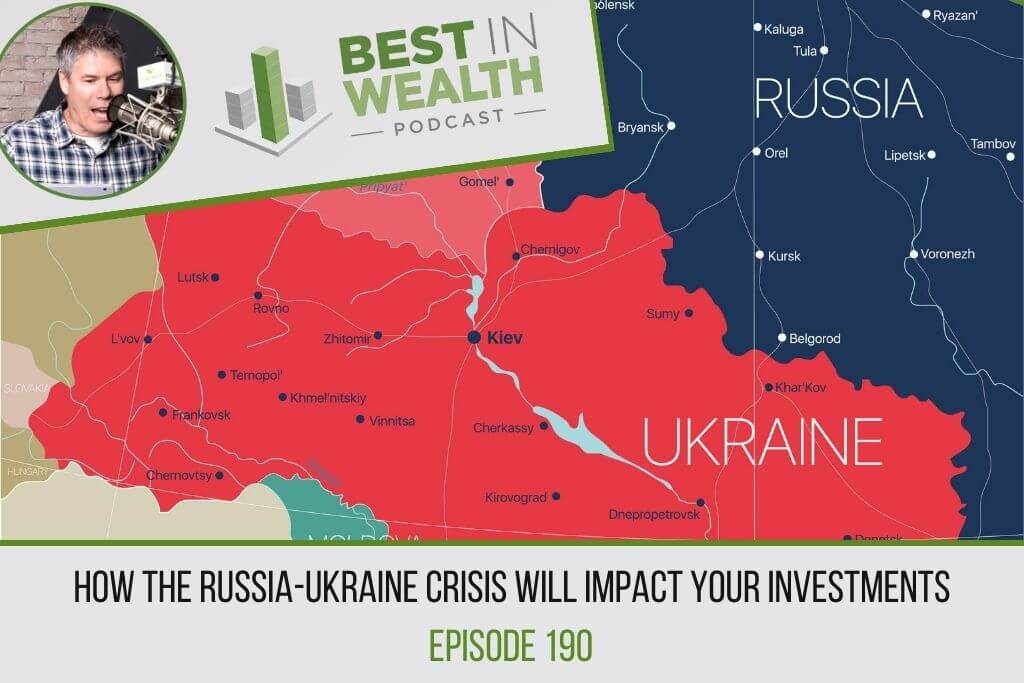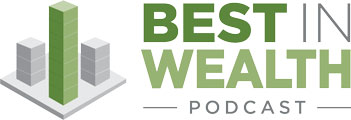How the Russia-Ukraine Crisis Will Impact Your Investments, Ep #190

Russia began its invasion of Ukraine on February 24th, 2022. Not surprisingly, the stock market did not respond well to the news. Investors sold off considerably in the morning’s open. But things began to stabilize when no one expected it to. On day three of the conflict, the S&P 500 was up almost 3%. Why did that happen?
It’s not clear what the end game of the conflict is—it is just getting started. One thing is for certain: the market doesn’t like uncertainty. On Thursday, there was considerable angst among investors. Many investors—in an attempt to time the market—moved into less risky investments than stocks.
Is that a wise move? To determine the best exit and re-entry points, my colleague looked at the market six months prior to the invasion and 18 months after in five of the most recent wars. When was the best time to get back in? Find out in this episode of Best in Wealth!
How will the Russia-Ukraine crisis impact your investments? I share my educated opinion in this episode of the Best in Wealth podcast! #wealth #retirement #investing #PersonalFinance #FinancialPlanning #RetirementPlanning #WealthManagement Click To TweetOutline of This Episode
- [1:09] How do you handle it when your child is sick?
- [3:51] The Russia-Ukraine conflict and its impact on your investments
- [6:33] The last 5 times we had major conflict in the world
- [7:57] The Vietnam War (November 1, 1955 – April 30, 1975)
- [9:17] The Gulf War (August 2, 1990 – February 28, 1991)
- [10:51] The Afghanistan War (October 7, 2001 – August 30, 2021)
- [12:15] The Iraq War (March 20, 2003 – December 15, 2011)
- [13:28] The Crimean Crisis (February 20, 2014 – March 26, 2014)
- [15:42] Why you should not sell everything and wait it out
- [18:29] Everything is changing day by day
The Vietnam War (November 1, 1955 – April 30, 1975)
August 2nd, 1964 was invasion day. The bottom of the market happened two months before invasion day. 18 months later, stocks were considerably higher.
The Gulf War (August 2, 1990 – February 28, 1991)
US intervention started on January 17th, 1991. Six months prior to the invasion, the S&P was around $370. It dropped all the way to $300, moved up, and hit a huge drop. By invasion day, you should’ve already sold everything. You would have to buy back on the very day of the invasion—the opposite of what most people think. After invasion day the stock market climbed considerably in one week alone ($300 to $370). 18 months later, it was a little over $400. You were best buying the dip 45 days before invasion day.
The Afghanistan war (October 7, 2001 – August 30, 2021)
The air campaign started on October 7th, 2001. The S&P was around $1,100 six months before the invasion. The market started climbing but took a serious drop two months before the invasion. 20 days before the invasion, we hit rock bottom. That is when you needed to get back in. The top of the market was 4.5 months before invasion day and buy-in was 30–45 days before invasion day. Because of the Dot-Com bubble, the stock market was down 18 months later.
What can previous wars such as Vietnam and Afghanistan tell us about how the market will react to the Russia-Ukraine Crisis? Learn more in this episode of Best in Wealth! #wealth #retirement #investing #PersonalFinance #FinancialPlanning… Click To TweetThe Iraq War (March 20, 2003 – December 15, 2011)
Six months prior to the first airstrike, the S&P 500 was hovering between $850–$900. Three months before was the high point (and when you should have sold). The best time to buy back was a week and a half before the invasion occurred. If you sold everything then, it would have been a big problem. Eight months later, the stock market was back up over $1,100. The sell and buy point was months before the airstrikes.
The Crimean Crisis (February 20, 2014 – March 26, 2014)
Six months prior to the crisis, the stock market was down to around $1,650 after steadily rising for six months. 30 days before the invasion, the market hit a big dip. Two weeks before the invasion was the best time to buy back in. What happened next? The stock market rose considerably over the next 18 months.
The Present-Day Russia-Ukraine Conflict
Just like other wars, I expect that we will see some tough weeks and months because of the Russia-Ukraine Crisis. Stocks always seem to bottom out before the point of invasion. In ⅘ of the wars, stocks were significantly higher 6+ months later. But people are asking—does it make sense to sell everything and wait it out? To get back into the market when the dust settles? In this episode, I share my answer to these questions. Don’t miss it!
How should you manage your investments as the Russia-Ukraine Conflict is upon us? I share my thoughts in this episode of Best in Wealth! #wealth #retirement #investing #PersonalFinance #FinancialPlanning #RetirementPlanning #WealthManagement Click To TweetConnect With Scott Wellens
- Schedule a discovery call with Scott
- Send a message to Scott
- Visit Fortress Planning Group
- Connect with Scott on LinkedIn
- Follow Scott on Twitter
- Fortress Planning Group on Facebook
Audio Production and Show notes by
PODCAST FAST TRACK
https://www.podcastfasttrack.com
Podcast Disclaimer:
The Best In Wealth Podcast is hosted by Scott Wellens. Scott Wellens is the principal at Fortress Planning Group. Fortress Planning Group is a registered investment advisory firm regulated by the Securities Act of Wisconsin in accordance and compliance with securities laws and regulations. Fortress Planning Group does not render or offer to render personalized investment or tax advice through the Best In Wealth Podcast. The information provided is for informational purposes only and does not constitute financial, tax, investment or legal advice.



